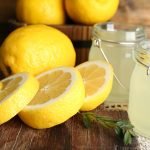When you think about it, it’s astounding how little most people know about nutrition, given that we eat three or more times a day from childhood to dotage. Most adults in the US have miserable diets, and even those who try hard to eat healthy may take many unfortunate turns, guided by information that’s just plain wrong. Take for instance, the common attitude toward fruit juice. Most people feel virtuous having some pasteurized Juicy Juice in a box with breakfast. Parents tell themselves they’ve given their kids a healthy alternative. School snack programs often pack a container of juice for the kids, again, as a healthy bonus.
But drinking juice (like those other beverage favored by kids — milk and soda) can cause an abundance of problems. “Both [soda and juice] are going to promote equal weight gain,” says Kimber Stanhope of the University of California, Davis. “Why [is soda considered] the only culprit?”
In fact, a glass of fruit juice typically contains more calories than a glass of soda. Eight ounces of Pepsi has 100 calories, versus 152 calories in an equivalent serving of grape juice and 112 in a cup of orange juice. Even worse, perhaps, is the fact that drinking lots of juice ups the risk of diabetes and heart disease because juice contains simple fructose, which the liver converts to fat more readily than it converts sucrose. Unlike whole fruit (or even unfiltered fresh squeezed juice, for that matter), which breaks down slowly in the body because it contains fiber as well as juice, the pasterurized, purified, strained commercial juice option goes straight to the liver where the overload converts right to fat. Plus, the concentration of fructose in juice far outweighs the amount in a piece of fruit. A single glass of apple juice, for instance, has as much fructose as six apples. That’s a whole lot of sugar to consume at once.
Studies have found that drinking 12 or more ounces of fruit juice daily leads to a number of problems. First, there’s that obesity issue. A study in 1997 found that kids who drank more than 12 ounces of juice a day had a 3.5 times greater risk of being obese, compared to kids who drank little or no juice. And a 2006 study found that overweight kids who drank an extra glass of juice daily gained an extra pound each year. On the other hand, it should be mentioned that out of 21 similar studies reviewed in 2007, only six found that juice consumption among kids led to weight gain. Analysts assume that’s because kids who drink juice tend to have better diets overall than kids who don’t, since parents who monitor what their kids eat tend to give those kids juice. This means that juice still does lead to weight gain, but kids who drink juice with a good diet fare better than kids who drink soda as part of a horrible diet.
As if it isn’t bad enough that juice can make kids fat, other studies have found it can make them short as well. Plus, studies have found that kids who drink lots of juice have a higher incidence of hyperactivity.
So should you absolutely avoid juice? No, because not all juice is created equal. First, there’s a universe of difference between a bottle of commercial juice and juice you squeeze yourself. Within minutes of juicing, many of the nutrients and enzymes start to break down, rendering the benefits far less potent. By the time bottled juice gets to your mouth, particularly if it’s been processed, it’s a mere shadow of its original self. And juice is packed with nutrients — or should be. Though it’s rich in sugar, it’s also rich in vitamins, antioxidants, minerals, living enzymes, and an assortment of phytochemicals that your body easily assimilates. It also should be noted that there’s actually a whole lot more fiber/pulp in fresh squeezed juices than in the commercial varieties sitting on your grocer’s shelves. In addition, I reported on a study last year that found that juice — particularly grape juice — prevents plaque from forming on artery walls when consumed with high-fat foods. This means that juice can provide significant cardiovascular advantages that whole fresh fruit alone does not provide.
Unlike fresh juices, many packaged juices contain added sugars. Plus, many have been made from reconstituted concentrate, which means even less vitamin content and more chance of mystery ingredients. Also, if the juice isn’t organic, it can pack a pesticide punch. These factors may have contributed to the anti-juice sentiment expressed by experts such as Robert Lustig, a pediatric endocrinologist at UC San Francisco, who says, “The upside of juice consumption is so infinitesimal compared to the downside that we shouldn’t even be having this discussion.”
It certainly is wise to take note of how sugary fruit juice is and to regulate consumption of it. To reap the benefits, just add 50 percent water to the juice to dilute the sugar content, and always, always extract or squeeze your own from fresh, organic fruits and then drink it right away. Also, consider the type of juice: the vitamin and nutrient content varies considerably from one type of juice to another. For instance, blueberry and grape juices contain over 200 percent more antioxidant phenols than apple juice. Yet apple juice has far more antioxidant content than orange or pineapple juices, not to mention its malic acid content that helps soften kidney and gallstones. But fresh pineapple juice is high in the enzyme bromlain, which breaks down rogue proteins and reduces inflammation. The bottom line is that each juice provides its own unique set of benefits. Then again, why not switch over to juicing vegetables, which provide a nutrient punch without delivering the sugar overload (although carrot juice contains plenty of sugar).
So, despite recent reports, fasting one day a week on fresh diluted juices is still one of the healthiest things you can do for your body. Add in a three day juice fast once a month and two one-week juice fasts a year, and you have the makings of a remarkable optimal health program.
:hc












Hi Jon,
This is a question that has bugged me for a while. It seems pretty obvious that drinking straight fruit juice is not a good daily habit, but what about fruit and vegetable juice mixes? I know some people say not to mix the two, but why not? The only tangible difference between the two is the sugar content, right? Also, im talking about blends you would make at home, not V8 Fusion, although that stuff is delicious.
I’m a big fan of carrot, apple, celery, and ginger juice myself.
Hi Jon,
My kids are all fat, short, and hyperactive, so naturally when I read this paragraph:
“”As if it isn’t bad enough that juice can make kids fat, other studies have found it can make them short as well. Plus, studies have found that kids who drink lots of juice have a higher incidence of hyperactivity.””
I wanted to read up more on these studies you’re referring to. However, I don’t see a single citation. Were these published in JAMA?
-SM
Actually, the citation was
Actually, the citation was listed in the link just above the stature comment. But here's a direct link to the study – http://www.jacn.org/content/18/4/346.full.pdf
What about V8 or tomato juice
Most of the so called fruit juices sold in stores (especially the ones marketed to kids) are basically comprised of mostly water, mixed with a some juice concentrate and LOADS of processed sugar or corn syrup!!! NOT GOOD!!!!
That JACN reference doesn’t support the hyperactivity association though. No studies supporting that assertion?
Thank you for this simply amazing information which I have been searching
for a long time on consumption of fruit and vegies.
And the You Tube on the human body last week
Juices have always been
Juices have always been considered as an alternative to sodas, unfortunately they've also been described 'healthy' on juice boxes. But as always actual health lies in the natural way. And its not very difficult to squeeze out juice from fruits when technology such as juicers exist!
I had my first gout attack
I had my first gout attack about 10 years ago.
At the beginning I was having attacks every 6 months. Then gradually I was getting them
every 3 months, then every month and eventually every week.
It started at my big toe and then it was moving sometimes in my knees,and generally all
around my joints, in my feet.And the pain was agonising.
I have tried all the cures you can imagine.I tried ACV, lemons, drinking a lot of water, but
to no avail.I tried water fasting, juice fasting,baking soda, again without success.
I almost gave up meat, limiting it to only once a week ,gave up alcohol completely,again
no success.
I was living on vegetables, lots and lots of fresh fruit, milk ,cheese beans and so on .My
eating habits could not be healthier ,or so I thought.But my gout was worsening.
Then I decided to increase the amount of fruit I was consuming, thinking that if some fruit
is healthy, more fruit will be more healthy.Some days I was eating fruit only ,others over 10
portions a day.
And alas my gout instead of improving it became chronic ,it was there all the time.
I was desperate I did not know what to do.
And then one day accidentally I read an article about fructose,which is contained in fruit in
large quantities.It said that it increases uric acid, in a matter of minutes.
Fructose is also present in table sugar, and in HFCS, which is used in soft drinks.
I put two and two together and realised what I was doing wrong.
I stopped eating fruit and all other sugars, for a period of 3 weeks,and by magic I saw a
dramatic improvement.Pain was gone, swelling was gone, I was fine.
I re introduced fruit again in my diet but reducing them to 1 or 2 a day, and my gout completely
disappeared.
I do eat more meat now, and occasionally have an alcoholic drink, and thank God everything
seems to be fine.
Fructose was my enemy.
Can you point me to where you
Can you point me to where you have talked about the differences between whole juice and strained juice? I’m about to begin the liver cleanse and would like to know if and when it matters to drink juice made in a high-powered blender as opposed to juice from a juicer.
It sounds like you’re talking
It sounds like you’re talking about a VitaMix type juicer. Jon loves the Vitamix, and I believe owns one. However, he is very clear that the VitaMix is not a juicer, it’s a blender – the best blender on the market, but a blender nonetheless. In a Q&A session at http://www.jonbarron.org/enzymes/natural-health-newsletter-boost-immune-system, Jon says the following, when talking about juicers.
“And then there's the VitaMix juicer. It juices the pulp so that you get even more nutrients than a conventional juicer (nutrients in the skin and fiber). On the other hand, because there is so much fiber, you don't get as much juice — which concentrates the nutrients. VitaMix certainly tells a great story, but over 99% of healers who recommend juicing recommend traditional juicers. It's a thought.”
Given that, Jon has always recommended using a real juicer for doing the liver detox.
You can make pulp-free juice
You can make pulp-free juice in the Vitamix by blending the fruit, veggies or what have you, then straining it through a nut milk bag (nut milk bags are available online).
I have done that several times, and it works quite well.
As far as juicers go, I got a Jay Kordich Power Grind juicer a little over a year ago, and cannot recommend it highly enough; best juicer I’ve ever owned. Makes pulp-free juice, is super easy to clean, and it makes nut milks, too, quickly and easily. Love it!
I drink (no sugar added)
I drink (no sugar added) Northland pomegranate / cranberry juice, diluted in half with water and over ice. Is this a type of juice I should be concerned about?
There’s no added sugar, and
There’s no added sugar, and you are diluting it, so there’s nothing to be “concerned” about. But as the article says: there’s a universe of difference between a bottle of commercial juice and organic juice you squeeze yourself. Within minutes of juicing, many of the nutrients and enzymes start to break down, rendering the benefits far less potent.